Rolf Boldrewood - Babes in the Bush
Здесь есть возможность читать онлайн «Rolf Boldrewood - Babes in the Bush» — ознакомительный отрывок электронной книги совершенно бесплатно, а после прочтения отрывка купить полную версию. В некоторых случаях можно слушать аудио, скачать через торрент в формате fb2 и присутствует краткое содержание. Жанр: foreign_antique, foreign_prose, на английском языке. Описание произведения, (предисловие) а так же отзывы посетителей доступны на портале библиотеки ЛибКат.
- Название:Babes in the Bush
- Автор:
- Жанр:
- Год:неизвестен
- ISBN:нет данных
- Рейтинг книги:4 / 5. Голосов: 1
-
Избранное:Добавить в избранное
- Отзывы:
-
Ваша оценка:
- 80
- 1
- 2
- 3
- 4
- 5
Babes in the Bush: краткое содержание, описание и аннотация
Предлагаем к чтению аннотацию, описание, краткое содержание или предисловие (зависит от того, что написал сам автор книги «Babes in the Bush»). Если вы не нашли необходимую информацию о книге — напишите в комментариях, мы постараемся отыскать её.
Babes in the Bush — читать онлайн ознакомительный отрывок
Ниже представлен текст книги, разбитый по страницам. Система сохранения места последней прочитанной страницы, позволяет с удобством читать онлайн бесплатно книгу «Babes in the Bush», без необходимости каждый раз заново искать на чём Вы остановились. Поставьте закладку, и сможете в любой момент перейти на страницу, на которой закончили чтение.
Интервал:
Закладка:
‘But what’s put this in your head, of all people in the world, Andrew?’ queried his master, becoming bold, like individuals, or corporate bodies, of purely defensive ideas, after observing tokens of weakness in the besieging force.
‘Weel, aweel, first and foremost, Laird, ye’ll no say that we haena eaten your bread and saut this mony a year; there’s been neither stint nor stay till’t. I hae naething to say against the wage; aiblins a man weel instructed in his profession should aye be worthy o’ his hire. Jeanie has been just spoiled by the mistress – my heart’s sairvice to her and the young leddies – till ilka land they were no in, wad be strange eneugh to her, puir body. And the lang and short o’ the hail matter is, that we loe ye and your bonnie lads and lassies, Laird, sae weel that we winna be pairted frae ye.’
As Mr. Effingham grasped the hand of the staunch, true servitor, who thus stood by him in his need, under whose gnarled bark of natural roughness lay hid so tender and true a core, the tears stood in his eyes.
‘I shall never forget this, Andrew,’ said he; ‘you and Jeanie, old friend, will be the comfort of our lives in the land over-sea, and I cannot say what fresh courage your determination has given me. But are you sure it will be for your own advantage? You must have saved money, and might take a farm and live snugly here.’
‘I was aboot to acquent ye, Laird,’ said the conscientious Scot, too faithful to his religious principles to take credit for a disinterestedness to which he felt but partially entitled. ‘Ye’ll see, Laird, for ye’re weel acquent wi’ the Word, that the battle’s no always to the strong, nor the race to the swift. Ye’ll ken that, frae your ain experience – aweel, I winna just say that neither’ – proceeded Andrew, getting slightly involved between his quotations and his determination to be ‘faithful’ to his erring master, and by no means cloaking his sins of omission. ‘I’ll no say but what ye’ve been lettin’ ither folks lead ye, and throw dust in ye’re een in no the maist wiselike fashion, as nae doot ye wad hae dune wi’ the tenants, puir bodies, gin I had letten ye. But touchin’ my ain affairs, I haena sae muckle cause to brag; for maybe I was unco stiff-necked, and it behoved to chasten me, as weel’s yersell; I hae tint – just flung awa’ – my sma’ scrapin’s and savin’s, these saxteen years and mair, in siccan a senseless daft-like way too!’
Here Andrew could not forbear a groan, which was echoed by an exclamation from his master.
‘I am sincerely grieved – astonished beyond expression! Why, Andrew, surely you have not been dabbling in stocks and foreign loans?’
‘Na – nae ga-amblin’ for me , Laird!’ replied Andrew sourly, and with an accentuation which implied speedy return to his ordinary critical state of mind; ‘but if I had minded the Scripture, I wadna hae lost money and faith at one blow. “Strike not hands for a surety,”’ it saith, ‘but I trusted Geordie Ballantyne like a brither; my ain cousin, twice removed. He was aboot to be roupit oot, stock and lock, and him wi’ a hoosefu’ o’ weans. I just gaed surety to him for three hunder pound!’
‘You were never so mad – a prudent man like you?’
‘And he just flitted to America, fled frae his ain land, his plighted word, and left me to bear the wyte o’t. It’s nae use greetin’ ower spilt brose. The money’s a’ paid, and Andra’ Cargill’s as puir a man’s when he cam’ to The Chase, saxteen years last Michaelmas. Sae, between the heart-break it wad be to pairt wi’ the family, and the sair heart I hae gotten at pairtin’ wi’ my siller, the loss o’ a friend – “mine own familiar freend,” as the Psawmist says – as weel’s the earnings o’ the maist feck o’ my days, at ae blast, I hae settled to gang oot, Laird, to Austra-alia, and maybe lay oot a wheen straight furrows for ye, as I did lang syne on the bonnie holms o’ Ettrick.’
Here Andrew’s voice faltered, and the momentous unprecedented conversation ended abruptly.
The unfeigned delight with which his wife and daughters received the news did much to reconcile Mr. Effingham to his expatriation, and even went far to persuade him that he had, in some way, originated the whole idea. Nor was their satisfaction unfounded. Andrew, with all his apparent sternness and occasional incivility, was shrewd, capable, and even versatile, in the application of his industry and unerring common sense to a wide range of occupations. He was the ideal colonist of his order, as certain to succeed in his own person as to be the most helpful and trustworthy of retainers.
As for Jeanie, she differed from her husband in almost every respect, except in the cardinal virtues. She had been a rustic celebrity in her youth, and Andrew occasionally referred still, in moments of unbending, to the difficulties of his courtship, and the victory gained over a host of rival suitors. She still retained the softness of manner and tenderness of nature which no doubt had originally led to the fascination of her masterful, rugged-natured husband.
For the rest, Jean Cargill had always been one of those servants, rare even in England, the land of peerless domestics, whose loving, unselfish service knew no abatement in sickness and in health, good fortune or evil hap. Her perceptive tastes and strong sense of propriety rendered her, as years rolled on, a trusted friend; an infinitely more suitable companion for the mistress and her children, as she always called them, than many a woman of higher culture. A tireless nurse in time of sickness; a brave, clear-headed, but withal modest and cautious, aid to the physician in the hour of peril. She had stood by the bedstead of more than one member of the family, in the dark hour, when the angel of death waited on the threshold of the chamber. Never had she slackened or faltered, by night or day, careless of food or repose till the crisis had passed, and the ‘whisper of wings in the air’ faded away.
Mrs. Effingham, with all her maternal fondness and devotion, had been physically unable at times to bear up against the fatigue of protracted watching and anxiety. She had more than once, from sheer bodily weakness, been compelled to abandon her post. But to Jeanie Cargill, sustained by matchless love and devotion, such a thing had never occurred. At noon or midnight, her hand was ever ready to offer the needful food, the vital draught; her ear ever watchful to catch the faint murmur of request; her eye, sleepless as a star, was ever undimmed, vigilant to detect the slightest change of symptom. Many nurses had been heard of, seen, and even read of, in the domestic circles of Reigate, but in the estimation of every matron capable of giving an opinion, Jeanie Cargill, by countless degrees of comparison, outshone them all.
That night, when Mrs. Effingham, as was her wont, sought relief from the burden of her daily cares, and the crowding anxieties of the morrow, ‘meekly kneeling upon her knees,’ it appeared to her as if in literal truth the wind had been tempered to the shorn lamb. That terrible travel into the unknown, the discomforts and dangers of the melancholy main, with the dreary waste of colonial life, would be quite different adventures, softened by the aid and companionship of everybody’s ‘dear old Jeanie.’ Her patient industry, her helpful sympathy, her matchless loyalty and self-denial, would be well-springs of heaven-sent water in that desert. Andrew’s company, though not socially exhilarating, was also an invigorating fact. Altogether, Mrs. Effingham’s spirits improved, and her hopes arose freshly strengthened.
No sooner was it settled that Andrew and his fortunes were to be wafted o’er the main, in the vessel which bore the Effingham family, than, with characteristic energy, he had constituted himself Grand Vizier and responsible adviser. He definitely approved of much that had been done, and counselled still further additions to the outfit. Prime and invincible was his objection to leave behind a certain pet ‘Jersey coo,’ ‘a maist extraordinar’ milker, and for butter, juist unco-omon. If she could be ta’en oot to thae parts, she wad be a sma’ fortune – that is, in ony Christian land where butter and cheese were used. Maybe the sea-captain wad let her gang for the value o’ her milk; she was juist in the height o’t the noo. It wad be a sin and a shame to let her be roupit for half price, like the ither kye, puir things.’
Читать дальшеИнтервал:
Закладка:
Похожие книги на «Babes in the Bush»
Представляем Вашему вниманию похожие книги на «Babes in the Bush» списком для выбора. Мы отобрали схожую по названию и смыслу литературу в надежде предоставить читателям больше вариантов отыскать новые, интересные, ещё непрочитанные произведения.
Обсуждение, отзывы о книге «Babes in the Bush» и просто собственные мнения читателей. Оставьте ваши комментарии, напишите, что Вы думаете о произведении, его смысле или главных героях. Укажите что конкретно понравилось, а что нет, и почему Вы так считаете.












